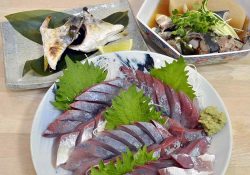
A barista shows a drink made using Atomo Coffee, which recreates the flavor of real coffee with date seeds, in Shibuya Ward, Tokyo.
15:30 JST, March 31, 2025
The areas of the world suitable for cultivating coffee are expected to decrease due to climate change — an issue drawing attention in Japan. Efforts are underway to ensure that coffee can continue to be enjoyed well into the future.
Ash zero waste cafe & bar in Shibuya Ward, Tokyo, offers espresso, caffe macchiatos and caffe lattes made with Atomo Coffee, a beanless coffee product.
Developed by a U.S. startup company, Atomo Coffee is made from date seeds, which are usually discarded, and other ingredients. The product, which is made to look and taste like coffee, has been available in Japan since summer last year. “It is made with upcycled ingredients and is an environmentally friendly product,” said Yuta Namekawa, a barista. “I hope people enjoy it.”
An international coffee research institution has warned that the land area suitable for cultivation of the popular Arabica coffee variety will decrease 50% by 2050, a problem which has come to be called the “2050 problem.” According to the All Japan Coffee Association, Japan was the fourth largest consumer of coffee in the world in 2023. With Japan’s coffee bean consumption per capita being around 3.5 kilograms per year, the problem is under the spotlight in the country.
Activities are underway to support and increase the income of coffee farmers. Cascara, the dried skin and pulp of coffee fruit, is one item piquing people’s interest. It is usually discarded in the process of extracting coffee beans. The name derives from a Spanish word meaning the husk of a seed.

Tea, right, and cookies made from cascara
A team comprised mainly of students developed a tea brewed from cascara in 2021 at Shizuoka University of Art and Culture in Hamamatsu. The product is now sold at Fair Trade Shop Teebom in Shizuoka and other places.
“The tea has a savory, fruity and refreshing flavor with a touch of sourness,” said Nahoko Imai, who works at the shop, which also sells cookies using cascara. “We have repeat customers who like the flavors of the products.”
Jun Takeda, an associate professor at the university who studies coffee farmers, explained that if the area for cultivating coffee decreases due to climate change and coffee production drops with it, the result will be a decline in revenue for coffee farmers, which could lead to more and more farmers leaving the coffee cultivation business.
“Since the 2050 problem is connected to the livelihoods of coffee farmers, it is important to secure a stable income for them,” Takeda said. “Buying fair trade coffee products and products like those using cascara will help increase farmers’ income and protect coffee culture.”
Damage from rains, droughts
Coffee cultivation is widespread in an area near the equator called the “coffee belt,” where the climate and soil is suitable for coffee cultivation. Brazil and Vietnam, which are located on the belt, are major coffee producers.
According to Taro Suzuki, a coffee expert and owner of the Ibaraki Prefecture-based Saza Coffee chain, which has a coffee farm in Colombia, coffee cultivation requires appropriate temperatures, dry weather and water. The Arabica coffee variety is susceptible to bad weather and more affected by climate change than many other varieties. In recent years, frost, prolonged spells of rain and droughts have caused extensive damage to coffee plants.
The plants are also damaged by a disease called “coffee leaf rust.” Caused by a fungus that feeds on the coffee plant, the disease makes the leaves drop and ultimately kills the plant. “Some coffee farms have seen all of their coffee plants die due to bad weather or disease,” Suzuki said.
Companies have begun taking measures to address the situation.
Key Coffee Inc. in Tokyo has been conducting cultivation experiments and taking other measures to help develop coffee varieties that are more adaptable to climate change. “We hope both drinkers and non-drinkers of coffee will take an interest in the issues surrounding the coffee industry and the situation in coffee cultivation areas,” an official at the company said.
Top Articles in Features
-

Tokyo’s New Record-Breaking Fountain Named ‘Tokyo Aqua Symphony’
-

Sapporo Snow Festival Opens with 210 Snow and Ice Sculptures at 3 Venues in Hokkaido, Features Huge Dogu
-

Tourists Flock to Ice Dome Lodge at Resort in Hokkaido, Japan; Facility Invites Visitors to Sleep on Beds Made of Ice
-

High-Hydration Bread on the Rise, Seeing Increase in Specialty Shops, Recipe Searches
-

Heirs to Kyoto Talent: Craftsman Works to Keep Tradition of ‘Kinran’ Brocade Alive Through Initiatives, New Creations
JN ACCESS RANKING
-

Japan PM Takaichi’s Cabinet Resigns en Masse
-

Japan Institute to Use Domestic Commercial Optical Lattice Clock to Set Japan Standard Time
-

Israeli Ambassador to Japan Speaks about Japan’s Role in the Reconstruction of Gaza
-

Man Infected with Measles Reportedly Dined at Restaurant in Tokyo Station
-

Videos Plagiarized, Reposted with False Subtitles Claiming ‘Ryukyu Belongs to China’; Anti-China False Information Also Posted in Japan






















